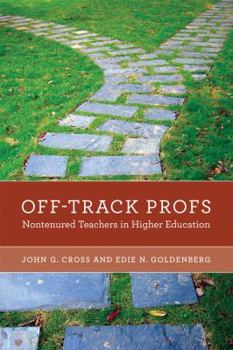Off-Track Profs: Nontenured Teachers in Higher Education
An investigation of non-tenure-track faculty at ten elite research universities and the implications for undergraduate education, institutional governance, and American preeminence in higher education.
Much attention has been paid to the increasing proportion of non-tenure-track faculty--adjuncts, lecturers, and others--in American higher education. Critics charge that universities exploit "contingent faculty" and graduate students, engaging in a type of bait and switch to attract applicants (advertising institutional standing based on distinguished faculty who seldom teach undergraduates), and as a result provide undergraduates with an inadequate educational experience.
This book, by two experienced academic administrators, investigates the expanding role of part-time and non-tenure-track instructors in ten elite research universities and the consequences of this trend for the quality of the educational experience, the functioning of the university, and the excellence of the academic environment. The authors discover, to their surprise, that the existing data on the workforce in higher education is ambiguous (different institutions use different terms for non-tenure track instructors; some even omit them from faculty data reports), making comparisons suspect. Many academic administrators are unaware of the tenured/nontenured breakdown of their own faculties and the hiring practices of their own universities.
The authors look closely at the teaching workforce at Berkeley, Illinois, Michigan, Virginia, Washington, Cornell, Duke, MIT, Northwestern, and Washington University, believing that these outstanding universities provide a strong test case of resistance to pressures on the traditional tenure system. They describe hiring trends and what drives them, explain why they matter if we want to improve undergraduate education, support collegiality on campus, trust in academic governance, prevent the erosion of tenure, and preserve America's global leadership in higher education.





